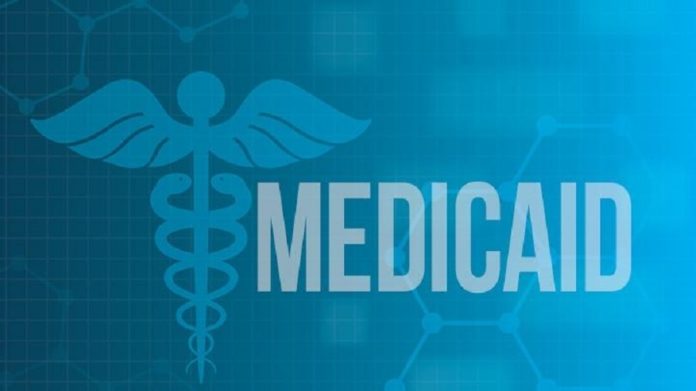(Updated to reflect final vote)
The Kansas Senate on Tuesday approved a bill giving Attorney General Kris Kobach’s office expanded authority to investigate fraud in the state’s welfare programs, including cash, food and health assistance.
The Senate voted 22-18 to pass a bill that would broaden the power of the Medicaid inspector general to investigate public assistance fraud beyond the state’s $4 billion
Currently, Inspector General Steve Anderson is limited to investigating the state’s Medicaid, MediKan and the Children’s Health Insurance programs.
The bill would give the inspector general’s office five more employees at a cost of nearly $800,000 for the first year in fiscal 2025.
Anderson initially sought 20 new full-time positions at a cost of $2.9 million in fiscal year 2025 and $2.4 million in fiscal year ’26.
“If this bill were to become law, our ability to root out fraud, waste and abuse would dramatically increase,” Anderson told the Senate health committee last month.
Anderson said it would be his hope that the increased funding will be offset by fraud that is prevented and the identification of wasteful spending.
The bill would expire July 1, 2028.
The bill was introduced by Kobach’s office. The inspector general is appointed by the attorney general.
The bill ran into opposition from Democratic state Sen. Pat Pettey of Kansas City, who said the bill would overlap with investigations now undertaken by the state Department for Children and Families.
Pettey said the Department for Children and Families has staff in place to investigate welfare fraud claims.
She said the agency has a fraud unit that includes a chief investigator, two deputies and 14 special fraud investigators and four experts in benefits eligibility.
“I really question why we as a body who have the responsibility to handle state funds and be fiscally responsible, that we would want to spend more dollars doing the same thing that is already being done and being done well,” Pettey said.
Pettey said during 2023, there were roughly 1,700 complaints about welfare fraud. She said in 225 cases, welfare fraud was found, which netted about $900,000 in collections.
Republican state Sen. J.R. Claeys, who works for the attorney general, disagreed with the idea that the investigative work is already being done.
“DCF policing itself is a bad idea,” Claeys said.
“It would be akin to some other agencies policing themselves,” he said.
“The Medicaid inspector general exists for a reason, and that is so there is a relatively impartial outside third party reviewing these agencies,” he said.
“I personally believe that is a good idea,” he said. “Some others may disagree.”
Republican state Sen. John Doll of Garden City confronted Claeys about his work for the Kansas attorney general.
“Being an employee of the attorney general, would this have an impact on your job either directly or indirectly?” Doll asked Claeys.
Claeys said the Medicaid inspector general was unrelated to his work for the attorney general.
Dinah Sykes, the top Democrat in the Senate, questioned whether the attorney general would have access to the individual records of welfare recipients.
Republican state Sen. Beverly Gossage, chair of the House health committee, said she amended the bill in committee to prevent the inspector general from demanding access to health records of anyone not enrolled in Medicaid.
The bill was backed by the Opportunity Solutions Project, the lobbying arm of the Foundation for Government Accountability, a 501(c)(3) based in Naples, Florida.
Earlier this session, Sam Adolphsen from the Foundation for Government Accountability gave a presentation to lawmakers about fraud in the welfare system.
Representing Opportunity Solutions Project, lobbyist Steve Greene said the bill would allow more thorough investigations and audits of assistance programs.
“This increased scrutiny will help to identify and rectify any instances of fraud or misuse of taxpayer dollars, ultimately ensuring that these resources are directed towards those who are most in need,” Greene said in written testimony.
Opponents of the bill said there are already methods in place for the state to guard against fraud in public assistance programs.
“These additional efforts to investigate and attack individuals receiving assistance and cast doubt on the programs is redundant of existing efforts at best and a tactic to take funds away from Kansans who need them at worst,” said Haley Kottler, campaign director for the civic group Kansas Appleseed.
Kottler said in written testimony that the state has multiple systems against which it
cross-checks data of applicants to detect potential fraud, including Social Security numbers, citizenship records and more.
She said the Department for Children and Families also uses an identity verification interface and cross-checks applications against the lottery and Department of Labor.
Anderson said he was not looking to take away benefits from Kansans who are “properly” enrolled in those programs.
“We’re trying to stop the fraudsters who are trying to drain these programs and take away valuable resources that are out there,” he said.
“We’re not trying to keep worthy people from getting the benefits they deserve,” he said.
















